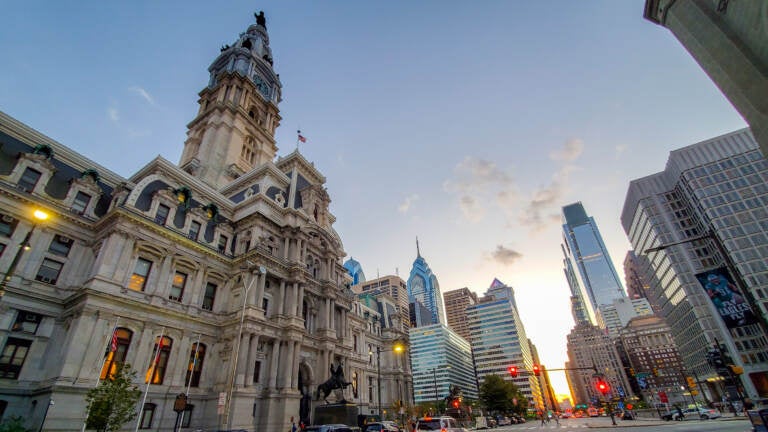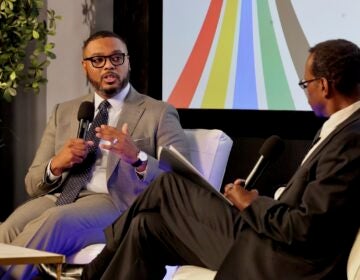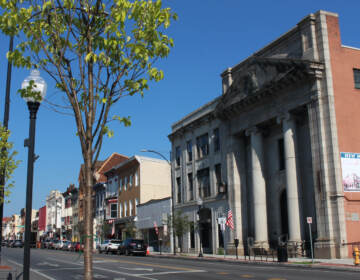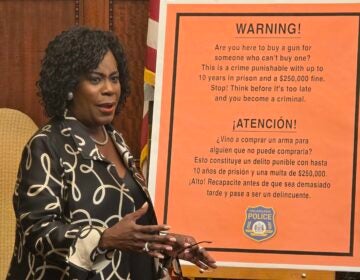Philadelphia City Council is poised to pass a new budget tackling public safety. Here’s what’s in it
This Thursday, City Council will approve a fiscal year 2024 budget. The current proposal includes public safety items such as policing and neighborhood cleanup.
Listen 0:57
Philadelphia City Hall, north facade. (Mark Henninger/Imagic Digital)
Philadelphia City Council will vote Thursday on a fiscal year 2024 budget that could funnel dollars into neighborhood cleanup, mental health services, policing and other initiatives that leaders hope will reduce the city’s shooting numbers.
There have been 191 homicides in Philadelphia this year, down 17% from 2022, according to an analysis from the Office of the Controller.
Nonfatal shootings are down 18% year-to-date as of mid-June, according to the controller’s office. Even as community leaders brace for an anticipated summertime spike in violence, Councilmember Kenyatta Johnson says he’s hopeful the hundreds of millions of dollars the city has put toward the problem in recent years will make a difference.
“Some of the gun violence we’re seeing is coming from years and years and years of disinvestment in Black and Brown communities, so we’re not going to solve this issue overnight,” said Johnson, who co-chairs council’s Special Committee on Gun Violence Prevention. “The investment I’ve been seeing in these last two budgets … [is] part of a larger, long-term strategy to change the trajectory of our young people here in Philadelphia.”
This year’s budget marks the last for Mayor Jim Kenney, whose term ends in 2024. He’s increased the anti-violence budget in response to the ongoing crisis during the last two years, allocating $155 million in 2022 and $208 million in 2023.
The total amount of spending on anti-violence efforts for FY2024 won’t be determined until later this month. Funds will likely be spread over multiple areas including the Philadelphia Police Department, the Streets Department, the Parks and Recreation Department and the Managing Director’s Office.
Earlier this month, the council released a list of specific public safety and quality of life initiatives they want. Those include:
Public Safety Cameras: $1 million for cameras at recreation centers and playgrounds.
Mental Health Crisis Response Teams: an additional $3 Million more for Mobile crisis response teams, which assist PPD in responding to 911 calls “where mental health problems are indicated”
Illegal Dumping: $1.475 Million, to the Streets Department
Vacant Lots: $1 Million, to the Pennsylvania Horticultural Society
Cleaning up Neighborhood Business Corridors: $3 Million, for the existing Taking Care of Business program
Code Enforcement in Licenses & Inspections and Law: $1 Million, for more inspectors
Recreation Centers: $15 Million for upgrades, in addition to already-allocated dollars from the Rebuild Program
Cleaning up long-neglected neighborhoods is an evidence-based crime prevention tool — removing trash and debris from vacant lots, planting new grass and generally maintaining the land resulted in a 29% reduction in gun violence in some areas of Philadelphia according to a 2018 study from the University of Pennsylvania and Columbia University.
In addition to quality of life investments, Councilmember Johnson is also pushing for a “Save Our Youth” initiative to fund services for youth including summer employment, trauma-informed behavioral health services and school monitors.
The current budget proposal funds some of Johnson’s asks, including a “same day pay” program that puts people to work cleaning and greening neighborhoods, and an AmeriCorps program that trains young people to work in the “green economy and urban farming.”
“If we want young people to put down guns, we have to give them something to replace that with,” Johnson said. “Afterschool programming, summer jobs, and making sure they’re having opportunities to achieve their goals and aspirations.”
In May, Kenney released a five-year financial and strategic plan to guide city leaders, including the next mayor, from 2024 to 2028. It includes funding for existing anti-violence programs, such as $1.4 million for Group Violence Intervention — a strategy that involves identifying people at risk of perpetrating violence, and offering them incentives for attaining legal employment or pursuing education. The model has shown some success in other cities, and did reduce shootings in Philadelphia neighborhoods where it was robustly implemented according to a 2023 University of Pennsylvania analysis commissioned by the city.
Some anti-violence programs supported by Kenny during his tenure have faced scrutiny. The Community Crisis Intervention Program, which sends street outreach teams to violence-impacted neighborhoods in the aftermath of shootings, did not meet its goals due to a lack of leadership, according to a city-commissioned evaluation of the program released last fall. An anti-violence grant program designed to aid grassroots groups proved to be difficult for some nonprofits to take advantage of due to onerous reimbursement requirements,according to grantees.
The current $6.2 billion budget proposal includes roughly $856 million for the Philadelphia Police Department, an increase of about $56 million from FY 2023 according to PPD testimony from an April 11 budget hearing.
The additional funding will go toward “contractually obligated pay raises as well as approved raises for exempt positions,” plus the transfer of 75 dispatcher positions previously housed under the Managing Director’s Office and 49 new civilian positions in the Office of Forensic Science, according to the testimony document. The funding will also support body-worn cameras for officers and PPD recruitment, “with a Diversity, Equity and Inclusion focus.”
Some Philadelphia gun violence activists have questioned whether funding policing will bring shooting numbers down. PPD’s budget has grown every year, and so have homicide totals, according to a 2020 analysis from the Office of the Controller.
“The police budget is so close to a billion dollars that it could afford a transformer — Optimus Prime could be the next police chief,” said poet and activist Lindo Jones, who goes by LindoYes. “If we can keep people in a quality learning environment, we keep people out of crime. If we can keep people employed, we can keep people out of crime.”
Philadelphia Police Department leaders say they need additional funding to help repair the officer shortage that departments across the U.S. are facing, and to improve community relations by having officers create positive programs and build trust with residents. The department recently released crime data showing homicides and nonfatal shootings are down in “pinpoint” areas where they’ve increased police presence.
The new budget proposal includes $3 million for “intensive recruitment”, $10 million in hiring bonuses for “hard-to-fill city positions” in public safety, including PPD and prisons, and $1.5 million for a Police Cadet program.
If you or someone you know has been affected by gun violence in Philadelphia, you can find grief support and resources online.
WHYY is your source for fact-based, in-depth journalism and information. As a nonprofit organization, we rely on financial support from readers like you. Please give today.





